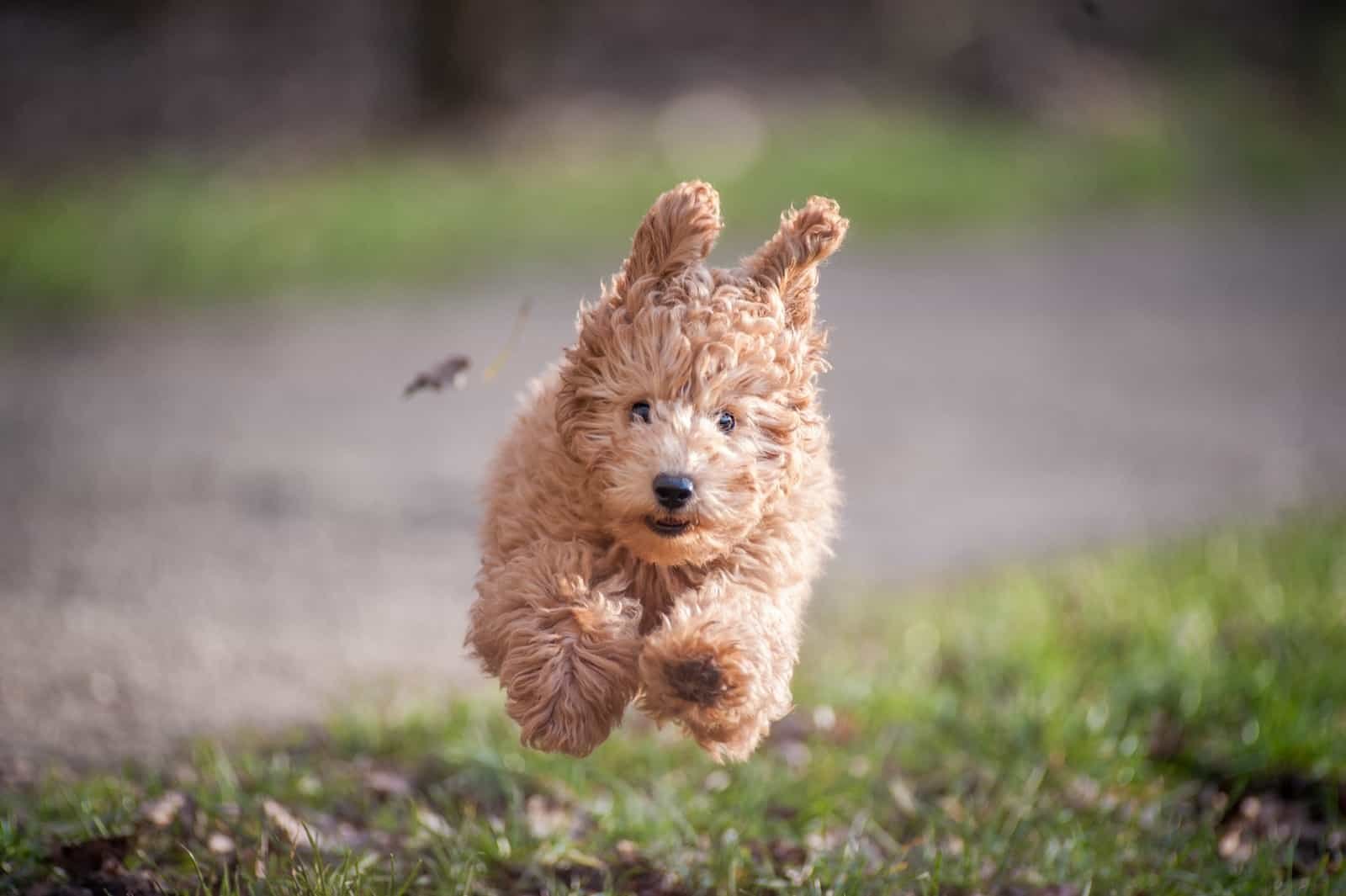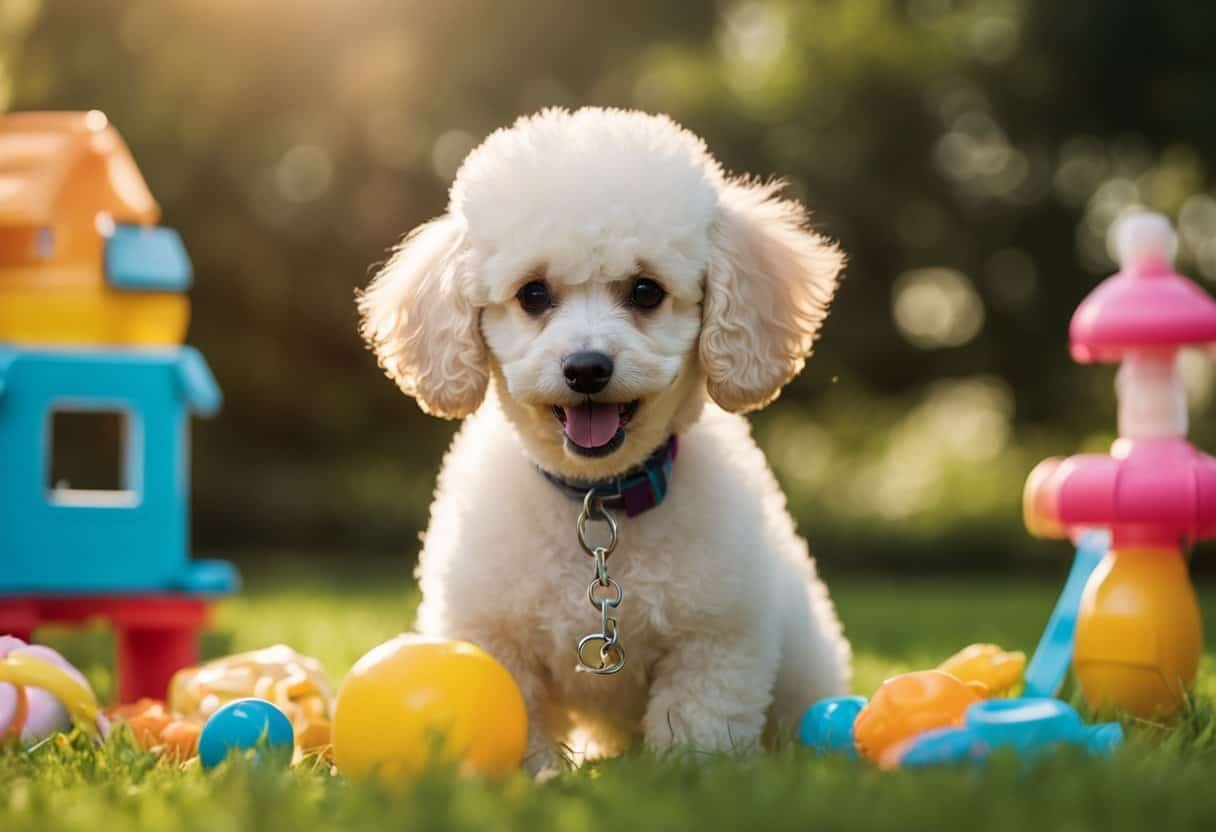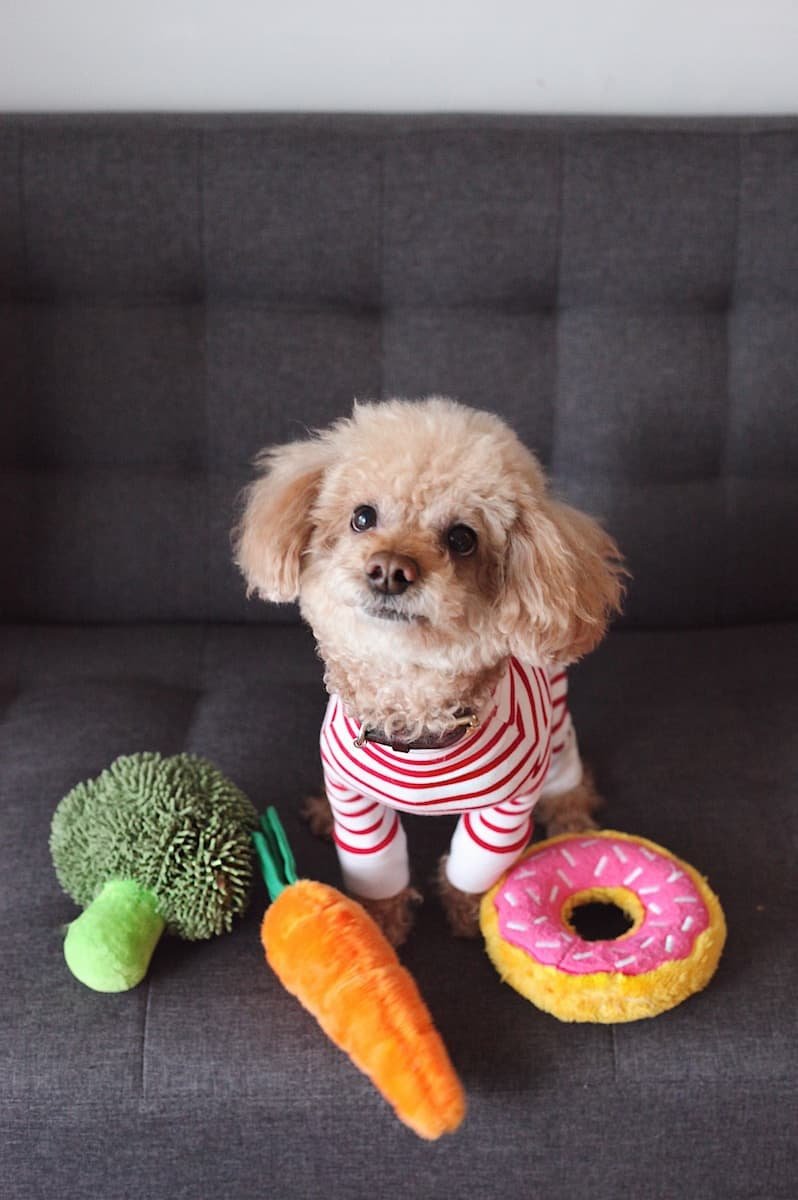Understanding the developmental stages of your poodle is essential for providing the best care at every phase of their life.
From the moment your poodle is born, they embark on a journey of growth that includes physical changes, behavioral adjustments, and learning new skills.
As a new poodle owner or a seasoned pet parent, recognizing and responding effectively to each stage of development can ensure your puppy matures into a healthy, well-adjusted adult dog.

Your poodle will go through several distinct growth stages, starting as a dependent newborn and progressing to an energetic puppy, and then into a mature dog.
Throughout these phases, your poodle will reach various milestones that will require your attention, understanding, and sometimes, patience.
The specific needs in terms of nutrition, training, socialization, and health care can vary greatly from one stage to another. This makes it imperative to stay informed about what to expect and how best to support your poodle.
Key Takeaways
- Recognizing each developmental stage helps provide appropriate care for your poodle.
- Poodle puppies need tailored nutrition, training, and socialization for overall well-being.
- Regular health checks and grooming are crucial as your poodle progresses towards adulthood.
Genetics and Initial Care
Understanding the genetic factors and the nuances of initial care is central to your Poodle’s health and development. This section will highlight the influence of genetics and the critical aspects of care immediately after birth.
Importance of Genetics
Your Poodle’s growth and health are deeply influenced by genetics.
The genes inherited from the parents affect not only the physical traits but also the predisposition to certain health conditions.
For example, Standard Poodles typically mature between 15 to 24 months, with their growth rate and adult size being directly linked to their genetic background.
Genetics can also play a role in the occurrence of health issues like hypoglycemia, with some bloodlines being more susceptible than others.
Newborn Care Questions
In the first few weeks of life, Poodle puppies are dependent on their mother’s milk for nutrition and antibodies.
If a puppy is unable to nurse, a replacement such as a high-quality goat’s milk formula may be necessary to prevent conditions like hypoglycemia.
Your care during this stage will raise questions about feeding frequency and signs of adequate nutrition.
Monitoring for steady weight gain and observing for a content and active behavior in puppies are indicators of successful feeding practices.
Developmental Milestones and Growth
In this section, you’ll learn about the specific stages that your Poodle will undergo from birth through maturity. Understanding these key phases of growth and what to expect will help you provide the best care at every step of their development.
Neonatal Period
During the neonatal period, which spans from birth to two weeks, your Poodle puppy is heavily dependent on their mother.
Their eyes and ears are closed, and they are unable to regulate their own body temperature. Early neurological stimulation during this phase is critical for their development.
Transitional Period
The transitional period occurs between two to four weeks of age. This is when your Poodle’s eyes open, and they begin to hear and see the world clearly.
Initial socialization and the beginnings of motor development mark this phase, setting the stage for more rapid growth.
Puppyhood to Adolescence
From two months to approximately six months, your Poodle will experience a vast amount of puppy growth.
At this stage, your Poodle will likely hit a majority of their developmental milestones, including teething and the development of motor skills.
Proper training during this time is vital to ensure good behavior as they grow.
- 2 months: Puppies start to learn basic commands
- 4 months: Begin the shift from puppy to adult food
- 6 months: Growth starts to slow down
Sexual and Emotional Maturity
As your Poodle approaches sexual maturity, typically between six and twenty-four months, they should be reaching their full grown size.
Emotional maturity, however, may take a bit longer to develop.
Training and socialization continue to be important during this stage as your Poodle learns to navigate adult behaviors and settles into their personality.
Nutrition and Feeding
Poodles require a specialized diet that supports their rapid growth and energetic nature. By providing the appropriate nutrition at different stages, you encourage optimal development and health.
Weaning Process
The transition from mother’s milk to solid food, known as the weaning process, typically begins around four to six weeks of age.
During this phase, your poodle puppy’s nutritional needs shift, requiring energy-rich foods to support growth.
Start by offering small amounts of puppy food moistened with water, gradually reducing the liquid until they’re eating dry food completely.
Puppy Food Selection
Choosing the right puppy food is crucial; it should be high in protein and contain appropriate fat levels to meet their high energy demands.
Look for foods specifically tailored to poodle growth requirements which support their development.
Remember, the wrong food can lead to improper bone growth and health issues later in life.
Training and Socialization
Training and socialization are foundational to your Poodle’s development. Implementing consistent training and exposure to various social settings will ensure your Poodle grows into a well-mannered and sociable dog.
Basic Commands
Begin teaching basic commands such as sit, stay, come, and heel as early as possible.
These are not only practical for daily interaction but also serve to establish your leadership and strengthen your bond.
Use positive reinforcement techniques, rewarding with treats or praise to encourage desired behavior.
Early training sets the stage for a lifetime of obedience and trust.
House-Training
House-training is about consistency and patience.
Establish a routine for your Poodle to follow, including regular meal times and frequent potty breaks.
Immediately after meals, take your Poodle to a designated outdoor area to relieve itself. Praise your pet enthusiastically for proper elimination to reinforce this behavior with positive reinforcement.
Social Skills Development
Developing your Poodle’s social skills involves gradual exposure to different people, animals, environments, and experiences.
Early socialization helps prevent behavioral issues and fears later in life.
Organizing playdates with other dogs and enrolling in puppy classes are excellent ways to promote healthy interaction.
Always monitor these sessions to ensure they remain safe and positive for your Poodle.
Health and Veterinary Care
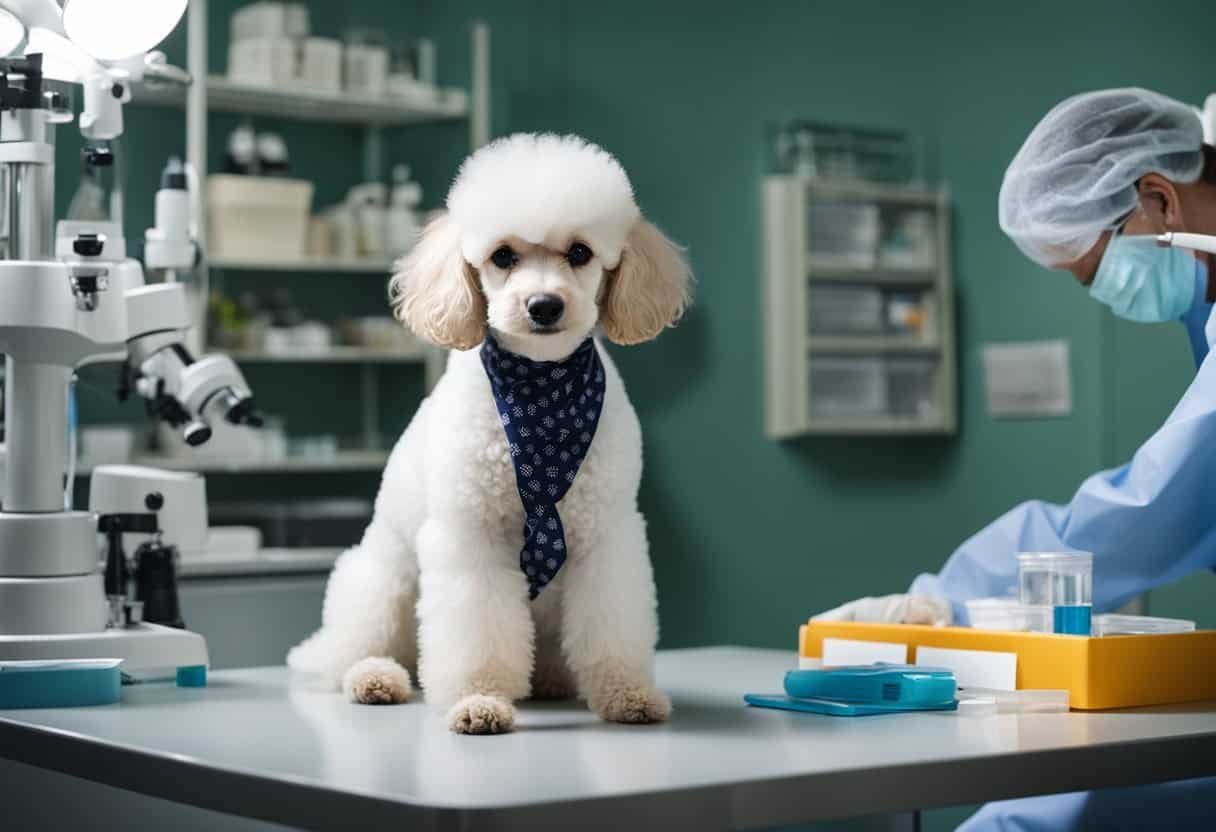
Your Poodle’s health depends on consistent veterinary care throughout their life stages. From puppyhood to senior years, attention to health care details is key for a vibrant, healthy Poodle.
Vaccinations and Check-Ups
Vaccinations play a pivotal role in protecting your Poodle against common diseases.
Your dog should receive initial vaccinations as a puppy, with follow-up boosters as recommended by your vet.
A typical vaccination schedule includes:
- 6 to 8 weeks: Distemper, parainfluenza, and canine hepatitis
- 10 to 12 weeks: DHPP (vaccines for distemper, adenovirus [hepatitis], parainfluenza, and parvovirus)
- 16 to 18 weeks: DHPP, rabies
- 12 to 16 months: DHPP, rabies
Regular check-ups are crucial to monitor your Poodle’s overall health.
Annual exams can detect issues early and provide prompt treatment, reducing long-term health risks.
Spaying/Neutering Considerations
Deciding whether to have your Poodle spayed or neutered is an important part of their health care. Here are a few specific considerations:
- Health Benefits: Neutered males can avoid testicular cancer, and spaying females reduces the risk of breast tumors and uterine conditions.
- Behavioral Impact: Neutering often reduces aggressive and territorial behavior in males.
- Age and Timing: Discuss the optimal timing with your vet, as it might vary based on your dog’s health, size, and breed specifics.
Stick to these guidelines to ensure your Poodle receives the essential veterinary care they need. Maintain an open line of communication with your vet for the best outcomes.
Grooming and Physical Care
Proper grooming and physical care are crucial in ensuring your Poodle’s health and well-being.
Regular attention to their luxurious coat and nails, along with maintaining their dental health, is essential for their overall health.
Coat and Nail Maintenance
Your Poodle’s coat requires regular grooming to prevent mats and tangles due to its curly nature. At a minimum, brush your dog’s coat every other day.
For standard Poodles, brushing should be thorough, as their larger size means more fur to manage. Shedding is minimal, but without proper grooming, their hair can mat and cause skin issues.
Professional groomers can assist with more complex grooming needs every 3-6 weeks. A groomer can provide a breed-specific cut and address any coat concerns. Between professional grooming sessions, monitor your Poodle’s coat for any signs of matting or irritation.
Nail trimming is as important as coat care. Trim your Poodle’s nails once or twice a month to prevent discomfort and mobility issues. If you hear their nails clicking on the floor, it’s time for a trim. If you’re uncertain about doing it yourself, a professional groomer or veterinarian can perform this task.
Dental Health
Poodles have baby teeth that will eventually be replaced by adult teeth. It’s important to ensure the transition goes smoothly by maintaining good dental hygiene from the start.
Regular teeth cleaning, either by brushing at home or through professional cleanings, helps prevent dental disease.
By the time your Poodle is an adult, they should have a full set of 42 teeth. Regular brushing several times a week with a dog-specific toothpaste can prevent tartar build-up and promote fresh breath. Start dental care early to acclimate your Poodle to the routine, which can help prevent future dental issues.
Behavior and Temperament

In this section, you’ll gain insights into the specific behaviors and temperamental aspects of Poodles at different stages of their development. By understanding their unique characteristics, such as biting tendencies, body language cues, and energy levels, you will be better equipped to manage and shape their behavior in a positive way.
Biting and Chewing
Poodles, particularly during puppyhood, are prone to biting and chewing as a natural exploration and teething behavior. To address biting, consistency is key: offer them chew toys or teething rings instead of your hand, and provide praise when they choose the appropriate item to chew on.
Understanding Body Language
Your Poodle communicates largely through their body language, giving you hints about their emotional state and intentions.
Tail wagging, ear positions, and posture can indicate whether your Poodle is feeling playful, anxious, or assertive. Pay close attention to these signs to better understand and respond to their needs.
Managing Energy and Stimulation
High energy levels in Poodles necessitate regular play and mental stimulation.
Activities ranging from fetch to agility courses can help manage their zest for life. Failing to provide enough exercise and mental challenges can lead to undesirable behaviors, so ensure your Poodle has a balanced routine.
Poodle-Specific Considerations
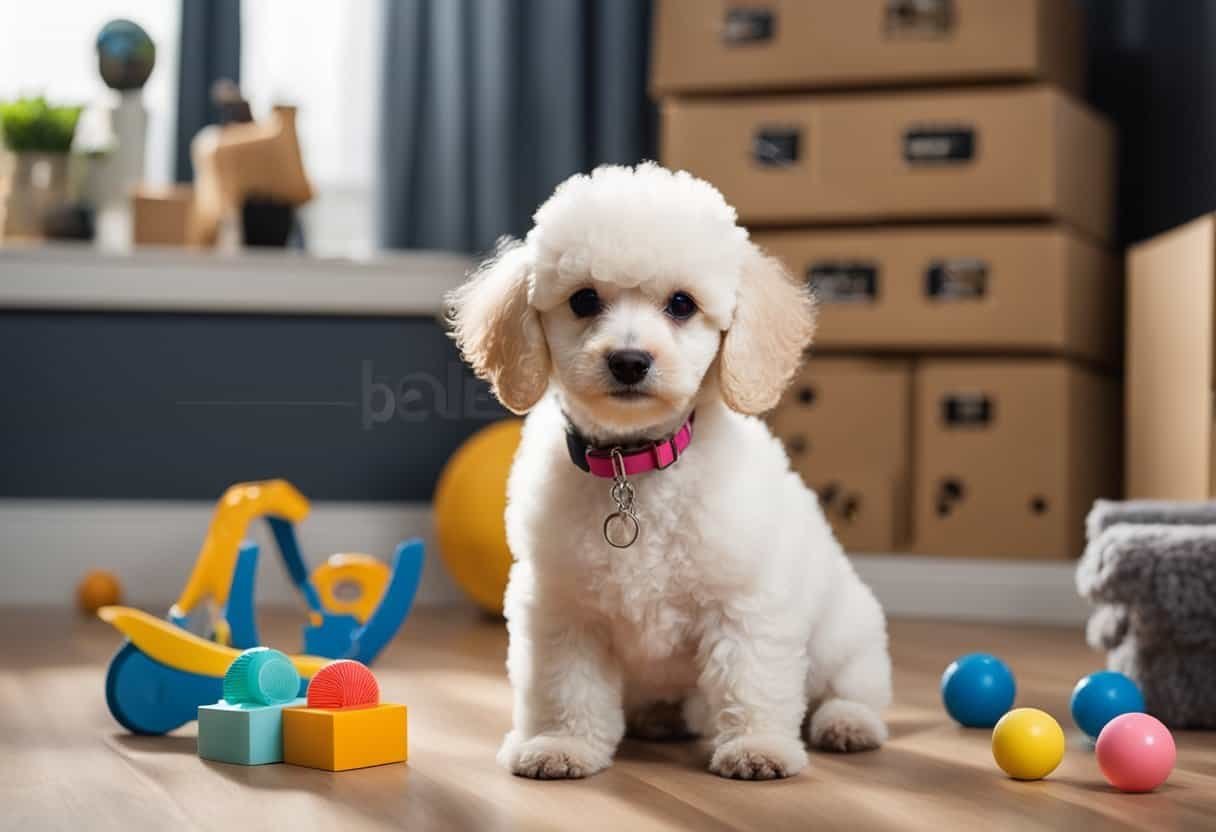
As you explore the journey of raising a Poodle, understanding the nuances of their growth and the typical health challenges they may face is crucial for providing the best care.
Understanding Sizes
Toy Poodles are the smallest class, standing no more than 10 inches tall.
Miniature Poodles offer a middle ground, ranging between 10 to 15 inches in height. The largest, Standard Poodles, grow beyond 15 inches tall.
Each size has its own growth timeline, influenced by distinct genetic factors. Your Poodle’s temperament can be affected by their size; smaller sizes might be more sensitive to their environment, while larger ones may require more exercise.
- Toy Poodles
- Height: Up to 10 inches
- Growth completes by: 6-7 months
- Miniature Poodles
- Height: 10-15 inches
- Growth completes by: 12-15 months
- Standard Poodles
- Height: Over 15 inches
- Growth completes by: 18-24 months
Dealing With Common Health Issues
Your Poodle’s size impacts their predisposition to certain health issues.
With Toy and Miniature Poodles, be vigilant about joint disorders like luxating patella, which is less common in Standard Poodles. On the other hand, larger Standards are more susceptible to GDV, also known as bloat.
Regardless of size, prioritize regular health check-ups and maintain a balanced diet to support healthy growth and temperament.
- Toy/Miniature Poodles
- Common Issues: Dental problems, Luxating patella
- Preventative Measures: Regular vet check-ups, Adequate nutrition
- Standard Poodles
- Common Issues: Hip dysplasia, Gastric Dilatation-Volvulus (GDV)
- Preventative Measures: Monitoring exercise, Managing diet
Preparing for Full-Grown Life

As your Poodle approaches full adulthood, you’ll need to adjust your routines to match their changing needs.
A fully grown Poodle not only differs in size and strength but also requires a shift in dietary, exercise, and training approaches to ensure a smooth transition into mature life.
Adapting to Adult Life
Exercise Needs: As your Poodle becomes fully grown, their activity needs may lessen slightly from the puppy phase, but maintaining regular exercise is still crucial for their physical health and mental stimulation.
Plan for at least one to two hours of daily activity to keep your Poodle’s confidence and bond with you strong.
Emotional Development: Full-grown Poodles require consistent security and confidence-boosting interactions.
Continue to provide plenty of praise and positive reinforcement as your Poodle masters new commands and skills. This encourages a well-adjusted, emotionally secure adult dog.
Lifestyle Adjustments for Owners
Feeding Routines: Your fully grown Poodle’s dietary needs will stabilize, so you should adjust their food intake to prevent overfeeding.
Select a high-quality dog food appropriate for their size and activity level, ensuring all nutritional needs are met for sustained health and vitality.
Health Check-Ups: Regular veterinary check-ups are essential to monitor your Poodle’s health as they reach maturity. This enables early detection of any potential issues, providing a safety net for your dog’s well-being.
Frequently Asked Questions
Poodle development varies by size and individual, but there are common milestones and behavioral changes that you should be aware of to foster a healthy development for your poodle.
What are the key milestones in a poodle’s development during the first year?
During the first year, your poodle will go through rapid physical and psychological changes, including socialization, basic training, teething, and growth spurts. At around 8 months, they may experience adolescence and display more independence.
At what age do poodles typically reach emotional maturity?
Poodles usually reach emotional maturity between 12 to 24 months. Standard Poodles can take longer, in some cases up to 24 months, whereas smaller varieties may mature faster.
What are common behavioral changes in poodles as they develop?
As they develop, poodles may exhibit common behaviors such as increased independence. They may also test boundaries during their adolescent phase. Additionally, they have an expressive nature that includes a blend of playfulness and loyalty.
How can I track my poodle’s physical development stages?
To track your poodle’s physical development, follow a growth chart by age. You should also monitor their weight and height compared to breed norms. Lastly, consult with your veterinarian to ensure they are growing at a healthy rate.
What are the distinct stages of puppyhood in poodles?
Puppyhood in poodles can be divided into neonatal, transition, socialization, ranking, adolescence, and adulthood stages. Each stage has its unique development characteristics and care requirements.
How do toy, miniature, and standard poodles differ in their development timelines?
Toy and miniature poodles often reach developmental milestones more quickly than standard poodles.
Standard poodles typically grow larger and may continue to fill out in physique until they are 2 years old. Meanwhile, toy and miniature poodles complete most of their growth earlier.


